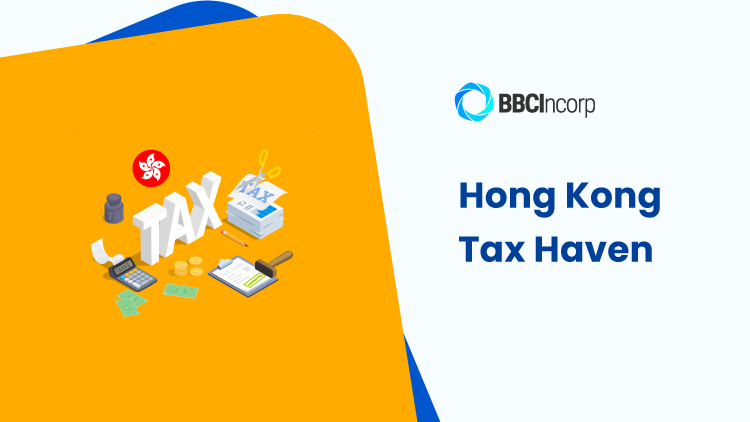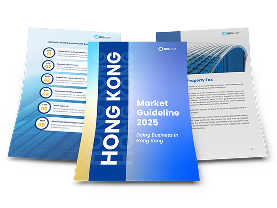
The argument of whether Hong Kong is a tax haven or not has been going on for a long time.
In today’s article, we aim to discover the facts and secrets behind Hong Kong’s tax haven status, ranging from its tax regime to financial services, and explore its future prospects.
Is Hong Kong considered a tax haven?
There are strict criteria that make up a tax haven, but commonly, it refer to well-governed states or jurisdictions which:
- impose zero or low taxation schemes for foreign investors
- lack of annual obligations and reporting requirements
- lack of transparency in financial dealings
Let’s find out in detail if Hong Kong meets all these requirements in the following section.
Low taxation schemes for foreign investor
Hong Kong offers relatively low tax rates for both individuals and corporations
While the country tax rates are favorable in comparison to many other jurisdictions, it does not provide zero or extremely low taxation schemes that are specifically tailored for foreign investors.
Profits tax
In Hong Kong, companies are liable for profits tax on income generated within the territory. The profit tax system in Hong Kong follows a two-tier rate structure, with rates ranging from 8.25% to 16.5% for incorporated businesses and 7.5% to 15% for unincorporated entities.
Additionally, income derived from sources outside of Hong Kong may be eligible for tax exemption through an offshore tax claim.
For example, if you establish a Hong Kong company to sell computer software in China, the profits earned from your activities in China will not be subject to taxation in Hong Kong.
Salaries tax
Hong Kong’s salaries tax rates follow a progressive rate system, varying from 2% to 17%, capped at 15% on assessable income (before the deduction of allowances). Individuals are only required to pay personal income tax on earnings generated within Hong Kong.
Annual obligations and reporting requirements
Hong Kong maintains a high level of transparency and compliance with international standards.
For example, companies incorporated in Hong Kong are obligated to adhere to stringent annual compliance requirements. These include
- meeting accounting and auditing standards;
- updating the Companies Registry with any changes;
- filing annual returns and taxes; and
- ensuring the renewal of business licenses while maintaining accurate bookkeeping records.
Transparency in financial dealings
Hong Kong places a strong emphasis on transparency in financial dealings, particularly in the context of anti-money laundering measures. Key aspects of this commitment include:
- Know Your Customer (KYC) procedure: This procedure is very common when opening a bank account in Hong Kong, which involves verifying the identity and background of customers to prevent money laundering and illicit financial activities.
- Anti-Money Laundering (AML) regulations: These regulations require financial institutions and businesses to report suspicious transactions and maintain records of customer transactions.
- International cooperation: Hong Kong actively cooperates with international organizations and authorities in matters related to financial transparency.
This approach is in line with Hong Kong’s commitment to preserving transparency and preventing unlawful financial activities.
So, is Hong Kong a tax haven?
Hong Kong can be viewed as a tax-efficient jurisdiction rather than a traditional tax haven. The country provides favorable tax conditions but does not meet all the criteria commonly associated with being a tax haven.
Explore more
Related insights on Hong Kong taxation and business structures, including how tax exemption Hong Kong works under the territorial tax system and the key steps involved in Hong Kong offshore company setup to support your global business expansion.
Advantages of Hong Kong beyond a tax haven
Countless things can be told about Hong Kong. Rather than consider Hong Kong as a tax haven like the British Virgin Islands, Belize, or Seychelles, it would be more precise if you attach this city to the image of a low-tax jurisdiction with a business-friendly environment.
Below are some interesting facts about Hong Kong as more than a tax haven:
Business-friendly environment
Hong Kong is holding the impressive 3rd position globally for business ease according to the Ease of Doing Business Report. Notably, the city secured the top spot for ‘dealing with construction permits’ and achieved second place for ‘paying taxes.
The city maintains its high rankings due to its ongoing commitment to implementing business-friendly reforms, ensuring a conducive environment for entrepreneurs and investors.
Accessible immigration schemes
Hong Kong offers various immigration schemes that allow individuals and families to relocate to the city. Some of the popular schemes include:
- the Employment Visa for skilled professionals
- the Investment Visa for investors
- the Quality Migrant Admission Scheme (QMAS)
- the Top Talent Pass Scheme (TTPS)
And many more schemes to facilitate the influx of diverse talents and resources, contributing to the city’s vibrancy. Learn more information available on this website.
Developed free-market economy
Hong Kong encourages entrepreneurship and competition, fostering a dynamic business landscape. This is obviously marked by several key features that contribute to its economic prowess:
- Hong Kong’s low taxation regime serves as a strong incentive for businesses to operate in the city and encourages investment. Both individuals and businesses in Hong Kong experience a relatively lighter tax burden compared to many other jurisdictions.
- The City operates as an almost free port, facilitating international trade without imposing excessive tariffs or trade barriers.
- Hong Kong established itself as a global financial center with a robust international financial market. The city’s financial infrastructure, including its stock exchange and banking system, is well-regulated and globally recognized.
Access to talented workforce
Hong Kong has a highly educated and multilingual workforce. It provides access to a talent pool with expertise in various industries.
Ecommerce opportunities
The city is at the forefront of digital innovation, with a tech-savvy population and a thriving startup ecosystem, offering vast potential for e-commerce growth and innovation.
Free ebook
Everything you need to start business in Hong Kong
Find out in a matter of minutes.

Hong Kong tax haven and its commitment
In the coming years, Hong Kong is committed to remaining relevant and competitive in our rapidly evolving world.
To achieve this goal, Hong Kong has been proactive in adapting to new economic challenges and global standards. It has put in place modern regulations to enhance transparency, combat money laundering, and adhere to international tax compliance requirements.
Hong Kong significant controller register
Through international collaborations and new legislation, Hong Kong has been actively working to enhance transparency in its business environment. One noteworthy development is the introduction of the Hong Kong’s significant controller register (SCR).
Effective from March 1, 2018, the Companies (Amendment) Ordinance 2018 now requires nearly all Hong Kong-incorporated companies, with only a few exceptions, to establish and maintain a Significant Controller Register (SCR) to document beneficial ownership information.
Double taxation agreements
As of August 2020, the city has entered into double taxation agreements with more than 40 jurisdictions. These countries include Austria, Belarus, Belgium, Canada, Estonia, France, India, Ireland, Japan, Korea, New Zealand, Qatar, Spain, the United Kingdom, and others.
Exchange of financial account information
The exchange of financial account information has seen developments in Hong Kong as well. To enhance its network for automatically sharing financial account information for tax purposes, Hong Kong enacted the Inland Revenue (Amendment) (No.2) Ordinance in 2019, which was gazetted on March 1, 2019.
This amendment expanded the list of jurisdictions with which Hong Kong exchanges financial information, adding 51 new jurisdictions to the existing list. As a result, the total number of jurisdictions for which financial information is reportable increased to 126.
Transfer pricing
Transfer pricing regulations in Hong Kong underwent significant changes in recent years. In July 2018, Hong Kong introduced transfer pricing rules, followed by the release of Departmental Interpretation and Practices Notes (DIPNs) 58, 59, and 60 in July 2019.
These developments granted the Inland Revenue Department (IRD) the authority to adjust transfer pricing for profits or charges arising from transactions between related parties that do not meet the arm’s length standard, potentially leading to tax advantages in Hong Kong.
Quick look at Hong Kong and major trading partners
Hong Kong’s trade landscape is marked by significant partnerships with key global players. Below are some key points we’ve highlighted for you:
- The World Integrated Trade Solution (WITS) revealed the top 5 import and export partners of Hong Kong prominently being China, the United States, India, Japan, and other Asian countries.
- Hong Kong’s strategic significance in the global trade arena is also underscored by its impressive rankings reported by the World Trade Organization in 2022 – as the world’s 10th largest trading entity for merchandise trade, and the 23rd largest for commercial services.
Such rankings is considered a testament to the city’s robust trading relationships and the efficiency of its trade processes.
Moreover, Hong Kong has inked 8 Free Trade Agreements (FTAs) with 20 economies. Additionally, the city has successfully finalized 23 Investment Agreements (IAs) with 32 foreign economies, reflecting its commitment to fostering international trade and investment.
With its commitment to sustainable development, Hong Kong opens doors to preferential trade conditions and serves as a global financial and logistics hub for companies to establish and expand their presence. Entrepreneurs can leverage the City’s strategic advantages to access regional and global markets, foster international partnerships, and navigate a dynamic and competitive business landscape.
Conclusion
Are you exploring dynamic opportunities by incorporating in the intriguing Hong Kong “tax haven”? Positioning as a gateway to the burgeoning Asian consumer market, Hong Kong allows businesses to strategically tap into the rising middle-class. This move facilitates seamless access to international markets and collaborative tech ecosystems.
Beyond a mere legal step, incorporating in Hong Kong becomes a strategic move. If you’re considering establishing a company in Hong Kong and have concerns about the requirements and legal processes involved, feel free to reach out to BBCIncorp Team.
You can contact us through our chatbox or by sending us your queries to service@bbcincorp.com.
Frequently Asked Questions
What separates HK from other tax havens?
Aside from having strong privacy laws and favorable tax systems, Hong Kong also maintains an economic edge over other offshore havens. The service sector is the prime contributor to the country’s transitionary phase in 2020, making up 93.4% of the GDP at the time.
How does the tax system in Hong Kong work?
Hong Kong follows a territorial tax regime; any income that is earned or derived from Hong Kong is taxed.
Corporate tax for unincorporated businesses is 7.5% for the first HK$ 2 million and 15% after HK$ 2 million. For incorporated entities, this is 8.25% on the first HK$ 2 million in profits and 16.5% thereafter.
Corporate taxes do not apply to capital gains, shareholder dividends, and foreign-sourced income. Note that if you incorporate an offshore company in Hong Kong then there’s also the possibility of a tax exemption.
Disclaimer: While BBCIncorp strives to make the information on this website as timely and accurate as possible, the information itself is for reference purposes only. You should not substitute the information provided in this article for competent legal advice. Feel free to contact BBCIncorp’s customer services for advice on your specific cases.
Industry News & Insights
Get helpful tips and info from our newsletter!
Stay in the know and be empowered with our strategic how-tos, resources, and guidelines.






